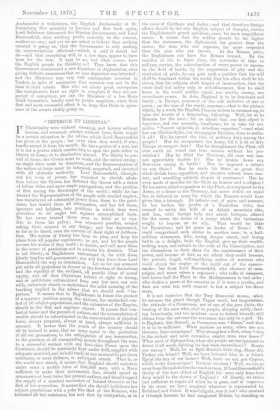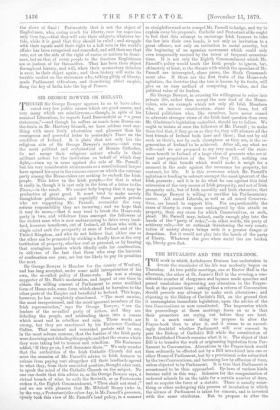" IMPERIUM ET LIBERTAS."
Ir Christianity were without meaning, and history without lessons, and economic science without laws, there might be a certain attraction in the advice which Lord Beaconsfield has given to the people ; but even then they would, if wise, hardly accept it from his mouth. Ile has a genius of a sort, but it is not a genius which enables hina to open the path either to liberty at home, or to domination abroad. For liberty to pre- vail at home, the Crown must be weak, and the nation strong ; no single class must be dominant, and the Representatives of the nation at large must be informed, respected, and invested with all ultimate authority. Lord Beaconsfield, through- out his term of power, has . crouched in slavish adula- tion before the Crown, has flattered the Queen with a vision of loftier titles and more ample prerogatives, and the position of first among the Sovereigns of the world ; while he has treated the Representatives of the people with studied neglect, has transferred all substantial power from them to the patri- cians, has denied them all information, inion, and has led them, io ignorant and helpless, into which they were powerless to do aught but register accomplished facts. He has never trusted them even so little as to con- fide to them his policy ; has, whenever possible, evaded asking their consent to any design ; and has deprecated, so far as he dared, even the exercise of their right of delibera- tion. His notion of liberty has been to plan, and keep his plans from all popular cognisance ; to act, and let the people reverse his action if they could ; to decide, and call upon them in the name of patriotism not to criticise his decision. That is not liberty, as Englishmen understand it, for with them liberty implies self-government ; nor will they learn from Lord Beaconsfield the way to domination. Let us for one moment put aside all prejudices in favour of the freedom of the nations and the equality of the civilised, all puerile ideas of moral equity, and all that Christians believe of right or wrong, and as politicians enfranchised from any law save our own wills, endeavour clearly to understand the solid meaning of the teaching implied in the advice that we should seek " ire- perium.' It means that to Englishmen in future the pursuit of a supreme position among the nations, the unchecked con- trol of all subject-populations, and the extension of the Empire, should be the first and supreme objects. It means that con- tent at home and the pursuit of culture, and the accumulation of wealth should be subordinated to the concentration of physical force, always prepared, always at hand, always sufficient in amount. It means that the youth of the country should all be trained to arms, that an army equal to the protection of all our possessions, to the subjugation of any insurrection, to the garrison of all commanding points throughout the seas, to a successful contest with any first-class Power upon the Continent, should be constantly kept under drill, supplied with adequate matAlriel, and be held ready at any moment to put down resistance, or meet defiance, or anticipate attack. That is, as the world now stands, it means that England should maintain under arms a mobile force of 300,000 men, with a Navy sufficient to make their movements free, should spend on armaments at least twice her present outlays, and should regard the supply of a constant succession of trained Generals as the first of her necessities. It means that she should hold down her subject populations with a yoke like that of the Romans, who tolerated all but resistance, but met that by extirpation, as in the cases of Carthage and Judea ; and that therefore foreign affairs should be the sole English subject of thought, victory the Englishman's grand ambition, arms his most magnificent career. It means that the soldier should be far higher than the statesmen, the diplomatist far greater than the orator, the man who can organise, far more respected than the man who can invent. At the Roman price, the Englishman can have the Roman reward. By the sacrifice of life to State duty, the surrender of time to military service, the subordination of every power to success on the field of battle, by the suppression of pity and the exaltation of pride, he can gain such a position that his will shall be dominant within his world, that his allies shall be his slaves, that his subjects shall despair of insurrection, that his rivals shall feel safety only in self-effacement, that he shall know in the world neither equal, nor worthy enemy, nor co-ordinate power. In Asia, England is to be dominant and lonely ; in Europe, possessed of the sole initiative of war or peace ; on the seas of the world, supreme—that is the picture which, by a word, the English Premier strives to summon up, to raise the hearts of a desponding following. Well, let us be Romans for the hour ; let us admit that our first object is imperium, and our necessity, loneliness ; let us take for our motto, " Parcere subject's, et debellare snperbos,"—and what has our Clodius-Sylla, our demagogue Dictator, done to realise it all ? Has he spread the idea of military duty among the people ? Has he reorganised the Army, till it is fit to defy Europe or conquer Asia ? Has he strengthened the Fleet, till over earth no vessel can bear cannon without his per- mission ? Has he filled, the Treasury, till even war can- not appreciably deplete it +I Has he beaten down any
first-class enemy in battle V Has lie imposed a tribute on any State ? Has he made his State so great that rivals shrink from opposition, and enemies retreat from con- test, and unwilling subjects despair of resistance ? Has he even made of sacrifice for the State an honour and a religion ? He has never added a squadron to the Fleet, or a regiment to the Army, or a denar to the Treasury, has never defied an equal foe, or defeated an army for which the Romans would have given him a triumph. At infinite cost of pains and treasure, he has broken the javelin of a Numidian tribe, has crossed in safety the hills of an Asiatic mountain elan, and has, with foreign help and adroit intrigue, altered for the worse the terms of a treaty which the barbarians sought to impose on an ally. That would be little
for Byzantium, and he poses as leader of Rome We could comprehend such advice in another man; in a half- military statesman, who, seeing danger ahead, and loving battle as a delight, bade the English give up their wealth- seeking ways, and submit to the yoke of the Conscription, and tax themselves to their skins for the maintenance of their power, and become at last, as we admit they could become, the patient, frugal, self-sacrificing nation of warriors who could clutch the empire of the world out of the cannon- smoke ; but from Lord Beaconsfield, who chatters of ,cam- paigns, and never raises a regiment ; who talks of conquest, and leaves half the 'Fleet in the Mediterranean in bad order ; who shakes a purse at his enemies as if it were a javelin, and dare not oven tax, such counsel is but a subject for fierce scorn.
It is not imperium that the Tory Democrat means, when he misuses the grand though Pagan word, but Imperialism, the attitude of a Comnenus, not of one of the gens Julia, the bearing of the man who, clad in purple, sleeping softly,, feed- ing luxuriously, and too indolent even to defend himself, still claims from the universe the reverence due only to a god. He is England, this Disraeli, as Comnenus was "Rome," and that is to to be sufficient. What matters an army, when one can threaten three campaigns? Why strengthen a fleet, when" this is the richest and most extensive empire man ever knew ?" What need of diplomatists, when the people are too ignorant to detect if all worth fighting for has been surrendered? Russia our enemy? Well, let us fight Russia's little dog, Shore Ali. Turkey our friend Well, we have lectured him as a friend. Egypt the key of our house ? Well, have we not got Cyprus, which is the door-scraper Burmah insolent ? Well, we can go away from Burmah before the sun has risen. If Lord Beaconsfield's theory of the true object of English life were only true? how deep would be the shame of England! Of liberty, we retain just sufficient to regain all when he is gone, and of imperium in his sense we have acquired whatever is represented by Zululand and Cabul. It was Caligula, was it not ? who received a triumph because he had conquered Britain by standing on the shore of Gaul ? Fortunately that is not the object of Englishmen, who, caring much for liberty, care for imperium only thus far,—that they will rule their subjects, whatever be- tide, while it is good that they should be ruled ; and struggle with their equals until their right to a full vote in the world's affairs has been recognised and conceded, and will then use that vote, not on the side of the right of castes or nations to domi- neer, but on that of every people to the freedom Englishmen are so jealous of for themselves. That has been their object throughout history, and will, when their momentary delusion is over, be their object again ; and then history will write its terrible verdict on the statesman who, talking glibly of liberty, made Parliament ridiculous, and thundering about empire, flung the key of India into the lap of France.



































 Previous page
Previous page